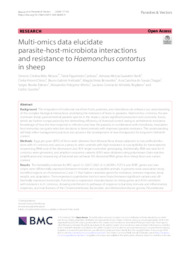Multi-omics data elucidate parasite-host-microbiota interactions and resistance to Haemonchus contortus. in sheep.
Multi-omics data elucidate parasite-host-microbiota interactions and resistance to Haemonchus contortus. in sheep.
Author(s): NICIURA, S. C. M.; CARDOSO, T. F.; IBELLI, A. M. G.; OKINO, C. H.; ANDRADE, B. G.; BENAVIDES, M. V.; CHAGAS, A. C. de S.; ESTEVES, S. N.; MINHO, A. P.; REGITANO, L. C. de A.; GONDRO, C.
Summary: The integration of molecular data from hosts, parasites, and microbiota can enhance our understanding of the complex biological interactions underlying the resistance of hosts to parasites. Haemonchus contortus, the predominant sheep gastrointestinal parasite species in the tropics, causes significant production and economic losses, which are further compounded by the diminishing efficiency of chemical control owing to anthelmintic resistance. Knowledge of how the host responds to infection and how the parasite, in combination with microbiota, modulates host immunity can guide selection decisions to breed animals with improved parasite resistance. This understanding will help refine management practices and advance the development of new therapeutics for long-term helminth control.
Publication year: 2024
Types of publication: Journal article
Keywords: 16S rDNA sequencing, Barber’s pole worm, EQTL, GWAS, Parasite resistance, RNA seq
Observation
Some of Embrapa's publications are published as ePub files. To read them, use or download one of the following free software options to your computer or mobile device. Android: Google Play Books; IOS: iBooks; Windows and Linux: Calibre.
Access other publications
Access the Agricultural Research Database (BDPA) to consult Embrapa's full library collection and records.
Visit Embrapa Bookstore to purchase books and other publications sold by Embrapa.

